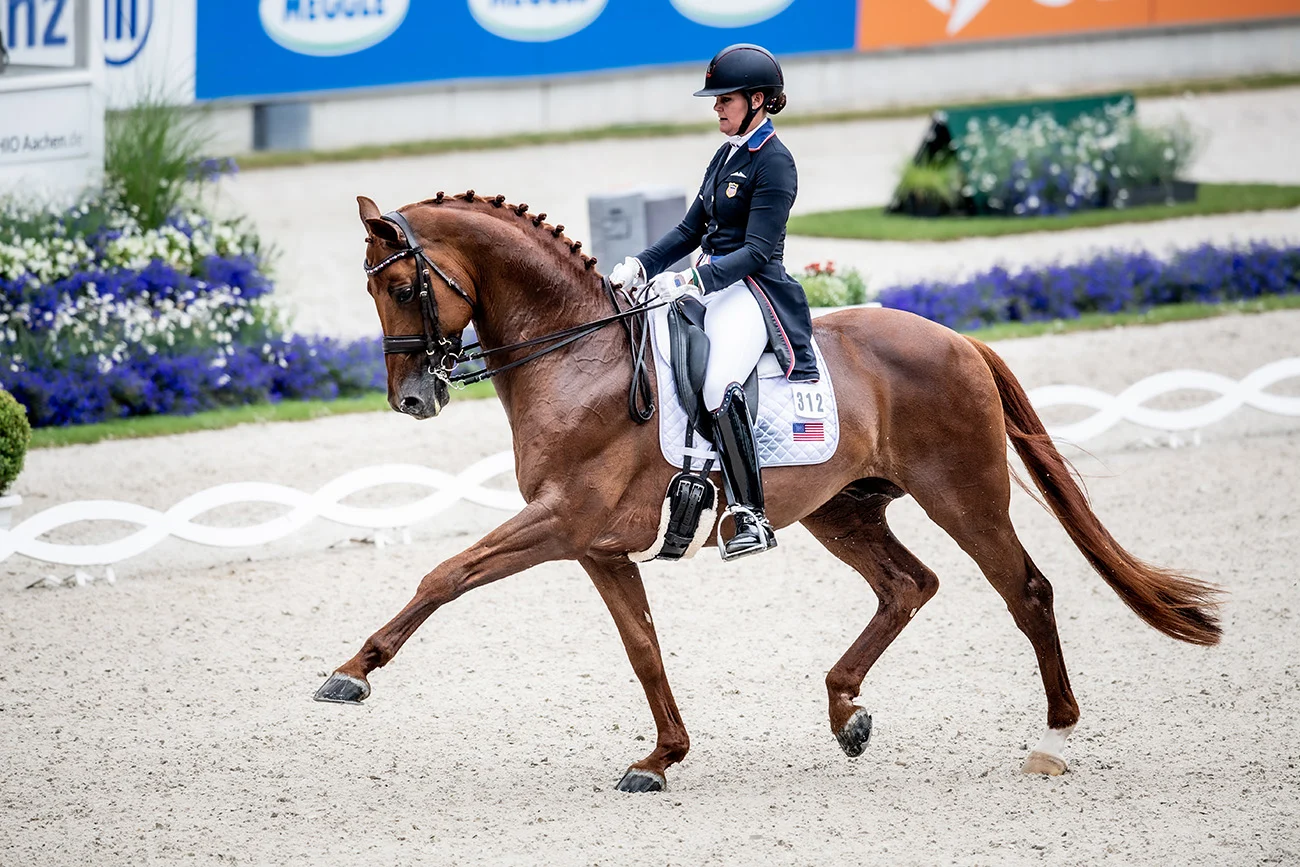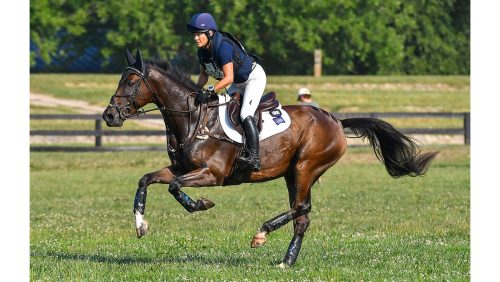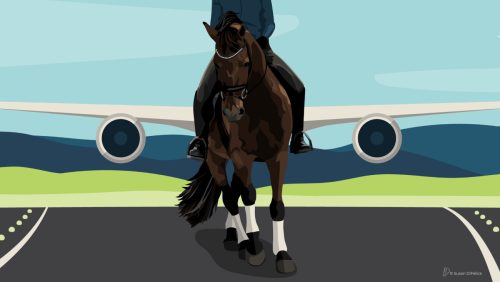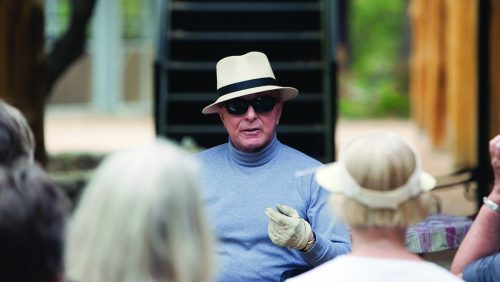Flipping through old photographs featuring her first horse, a one-eyed Quarter Horse named Copper, Sarah Tubman can see just how far she’s come from her early riding days. Though her mom, Francie Lockman, grew up riding in South Africa, the western tack that came with Copper was a bit of a mystery to her.
“There are plenty of family pictures where you see the saddle is on so far back; the bridle is upside down. I mean, it was a lot,” Tubman said. “We’ve come a long way since then, but it’s cute to kind of see the beginning like that.”
Tubman made a few pit stops along the way to becoming the international dressage rider she is today. She tried western pleasure and trail, sampled barrel racing and roping, and she tried her hand in the hunter/jumper world. She was an avid eventer for many years, competing up to the CCI3*-L level with Myster E.
“I did a little bit of everything, so I think having that diverse background is really helpful when it comes to training horses because you have a bigger toolbox,” she said. “Also I’m not afraid to go fast, and sometimes the horses just need to go forward and have fun.”

At 16 she went to work for David Wilson, and that’s where she fell in love with high performance dressage. For many years she operated her own training business with close to 50 horses in California, before a special chestnut horse named First Apple, a now-13-year-old Dutch Warmblood (Vivaldi—Oogappel, T.C.N. Partout) stallion owned by Summit Farm, changed her trajectory.
The pair made their small tour team debut at the 2019 Pan American Games (Peru) where they earned individual gold and team silver. For the past three years, they’ve been working on the Grand Prix, and most recently they made their large tour Nations Cup debut at the CHIO Aachen (Germany), held June 29-July 2, where they scored 69.67% and 70.04% in the Grand Prix and Grand Prix Special, respectively.
“Aachen is always an amazing experience. There aren’t that many people in the world who can say they’ve ridden at Aachen, so I’m so fortunate to have now done it twice,” she said. “I was on the five-star team for the U.S., so that was a great experience being on a team again. And you know, my horse is in a building process. This is a building year for us, so some parts of our test went great, and we had mistakes in things maybe I wish we hadn’t had.
“I come away from Aachen completely inspired and riding better and with big, lofty goals for the next year,” she continued. “I mean how can you not when you’re riding with the best in the world? We were joking and saying it’s basically the Olympics. To be honest, there’s more of a crowd, and all of the really top- notch riders that will be in the Olympics next year were there. So just to be riding in the same class with that caliber of horse and rider is incredible.”
Though Tubman, 34, spent most of her professional career in Murrieta, California, she describes where she lives now as fluid. Recently she and her husband, Lee Tubman, have been focusing on competing in Wellington, Florida, and for the last two years, spent the summer in Europe.
In addition to “Apple,” Sarah has Balia, an 11-year-old Westphalian (Belissimo—Felina, Florestan I) owned by Summit Farm, who debuted at Grand Prix this winter, and Ramon RS, a 12-year-old Wurttemberger (Don Diamond I—Marzurka H) owned by Jessica Friedrich, who started doing Intermediaire II tests in April. She also has 7-year-old Lyamora, a Dutch Warmblood by Ferguson that she purchased as a 3-year-old. The mare turned heads as a 4-year-old when she earned massive scores in a young horse class at the Adequan Global Dressage Festival (Florida), including a 10 for her canter.
“I have been keeping her at home and trying to find the most effective way to make her a Grand Prix horse in the shortest period of time without any stress,” Sarah said. “So I think she’s Apple times 10. She’s a ‘wow’ horse.”
Tell us about your first horse or pony.
My mom and her whole family are from South Africa, so when she moved to the United States, she said, “When I have a girl, I’m going to name it Sarah, and she’s going to ride.” My future was kind of planned for me early on. What ended up happening is my mom went back to South Africa to visit family and took me with, but my dad had to stay behind to work.
My dad is not a horse person—didn’t even really have a dog growing up—but we came home to a $500, 28-year-old, one-eyed pony. And he was so proud to have gotten that for me. [That was Copper], a Quarter Horse with one eye, but just the sweetest being, and [she] just let us learn how to love horses. We’d crawl on her back when she was laying down. All of those things kids should do, we did with that pony.
If you could ride any horse, past or present, who would you choose?
ADVERTISEMENT
I would probably like to ride Valegro. That horse’s connection and contact has to be what we all strive to have on every horse. Not only was he an incredibly powerful, amazing-moving horse, but it just looked like the connection was one of a kind. That’s something that would be cool to feel.
What quality do you value most in a horse?
The No. 1 is rideability. What separates a good horse from an amazing horse is just their willingness and rideability. At the end of the day, that willingness to work and that temperament can outdo talent just because—especially in dressage because of how things work—you can have a super talented horse, but if they are distracted or making mistakes with their rider, then the more average horse that’s extremely rideable and willing will sometimes beat that horse on any given day.
In a human?
I’m a big believer in passion. In this sport we’re crazy horse people, and we’ll do anything; we’ll spend 24 hours in the barn if necessary. We eat, sleep and breathe it. So whenever I see any kind of human with a passion, even if it’s not for horses, I have a lot of respect for [that].
Who inspires you?
I think that kind of changes as you go through life. Who mostly inspires me at the moment is my husband. We work together; he is my coach also. It’s a pretty cool thing to be able to work side-by-side with someone who is equally as hard working. So maybe on the day when I’m a little down in the dumps, he’ll be like, “Come on, let’s go. We’ve got things to do.”
If you could change one thing about the dressage world, what would it be?
I would wish that it could become more cost effective and afford- able for more people from different classes to be able to have access to such an incredible sport.
I wish it could end up being something like soccer because it’s very affordable. We all know with horses it’s a lot more than just buying a ball and showing up once a week, but a lot of it has to do with financially what people are able to do. And not just at the beginning level, but all the way towards the top.
What is your favorite movement to ride?
I really like to ride the passage and flying changes. I think it would be a toss-up between the two of them.
What animals do you have besides horses?
We have a Pomeranian and two Jack Russells. The Pomeranian is a little bit our sidekick. He’s the special one. He gets to travel everywhere with us, so he came to Europe and gets to fly to these countries and go to dinner with us and go to horse shows with us, mostly because the Jack Russells are a little rambunctious.
What’s the best feeling in the world?
ADVERTISEMENT
On a personal level, the best feeling in the world is coming home, and your dogs are happy to see you. There’s nothing like that really innocent happiness that they have when you’ve been away for a while.
Another best feeling in the world is standing up on the podium and having the American anthem played for you, with your flag up there in front of other countries. That’s a pretty cool feeling too.
What’s the best advice you’ve been given?
The best advice I’ve been given would be to follow your gut. When you do the right thing, the honest thing, and really hold true to your integrity, at the end of that it’s always positive. It might not be what you thought it was going to be, but it’s always a positive outcome.
What advice would you give to young riders?
Take as many lessons and get as much help as you can. And when you think you’ve had enough help, you haven’t. Get more. The more quality coaching that you can get, the better.
What three items are always in your refrigerator?
Peanut butter, jelly and ketchup. If I had to eat one thing for the rest of my life, three times a day, it would be peanut butter and jelly sandwiches, so that is always in my refrigerator, always good. That is my go-to, and then I put ketchup on everything—very American.
What are you currently reading or watching?
I’m obsessed with “Survivor,” and “Survivor” has 44 seasons, so I’ve just been binge-watching “Survivor.” It’s entertaining enough without being dramatic. There’s no blood and guts. There’s no swearing. It’s a good family show, so it’s not stressful. [When] we’re under a lot of stress with the horses, it’s kind of nice at the end of the day to do something that’s kind of bland.
Would you want to be on it, or do you just like watching it?
Oh my goodness, no. I grew up camping and fishing and doing all of that, but I am into nice hotels and air conditioning. I think it’s fun to watch other people figure it out, but I have no interest in having to make my own fire.
Where would you like to be in 10 years?
In 10 years I would like to have been to the Olympics maybe once, maybe twice, and continue to have a really successful business with successful clients. And hopefully I will have brought along or developed a couple more top Grand Prix horses.
This article appeared in the July 24-31, 2023, issue of The Chronicle of the Horse. You can subscribe and get online access to a digital version and then enjoy a year of The Chronicle of the Horse and our lifestyle publication, Untacked. If you’re just following COTH online, you’re missing so much great unique content. Each print issue of the Chronicle is full of in-depth competition news, fascinating features, probing looks at issues within the sports of hunter/jumper, eventing and dressage, and stunning photography.














